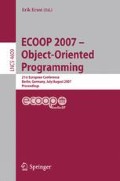Abstract
Abstract. Aspect-oriented advice increases the number of places one must consider during reasoning, since advice may affect all method calls and field accesses. MAO, a new variant of AspectJ, demonstrates how to simplify reasoning by allowing programmers, if they choose, to declare limits on the control and heap effects of advice. Heap effects, such as assignment to object fields, are specified using concern domains-declared partitions of the heap. By declaring the concern domains affected by methods and advice, programmers can separate objects owned by the base program and by various aspects. When desired, programmers can also use such concern domain annotations to check that advice cannot interfere with the base program or with other aspects. Besides allowing programmers to declare how concerns interact in a program, concern domains also support a simple kind of semantic pointcut. These features make reasoning about control and heap effects easier.
Access this chapter
Tax calculation will be finalised at checkout
Purchases are for personal use only
Preview
Unable to display preview. Download preview PDF.
References
Aldrich, J.: Open modules: Modular reasoning about advice. In: Black, A.P. (ed.) ECOOP 2005. LNCS, vol. 3586, Springer, Heidelberg (2005)
Aldrich, J., Chambers, C.: Ownership domains: Separating aliasing policy from mechanism. In: Odersky, M. (ed.) ECOOP 2004. LNCS, vol. 3086, Springer, Heidelberg (2004)
AspectJ Team: The AspectJ programming guide, Version 1.5.3. (2006), Available from http://eclipse.org/aspecti
Boyapati, C., Liskov, B., Shrira, L.: Ownership types for object encapsulation. In: POPL, pp. 213–223 (2003)
Clarke, D., Drossopoulou, S.: Ownership, Encapsulation, and the Disjointness of Type and Effect. In: OOPSLA (2002)
Clement, A., Colyer, A., Kersten, M.: Aspect-oriented programming with AJDT. In: Cardelli, L. (ed.) ECOOP 2003. LNCS, vol. 2743, Springer, Heidelberg (2003)
Clifton, C.: A design discipline and language features for modular reasoning in aspect-oriented programs. PhD thesis, Iowa State (2005)
Clifton, C., Leavens, G.T.: MiniMAO1: Investigating the semantics of proceed. Sci. Comput. Programming 63(3), 321–374 (2006)
Clifton, C., Leavens, G.T.: Observers and assistants: A proposal for modular aspect-oriented reasoning. In: FOAL (2002)
Clifton, C., Leavens, G.T.: Spectators and assistants: Enabling modular aspect-oriented reasoning. Technical Report TR #02-10, Dept. of Computer Science, Iowa State University (October 2002)
Dantas, D.S., Walker, D.: Harmless advice. In: POPL (2006)
Dietl, W., Müller, P.: Universes: Lightweight ownership for JML. Journal of Object Technology 4(8), 5–32 (2005)
Filman, R.E., Elrad, T., Clarke, S., Akşit, M. (eds.): Aspect-Oriented Software Development. Addison-Wesley, Reading (2005)
Flatt, M., Krishnamurthi, S., Felleisen, M.: A programmer’s reduction semantics for classes and mixins. In: Formal Syntax and Semantics of Java, ch. 7, pp. 241–269. Springer, Heidelberg (1999)
Griswold, W.G., Sullivan, K., Song, Y., Shonle, M., Tewari, N., Cai, Y., Rajan, H.: Modular software design with crosscutting interfaces. IEEE Software, 51–60 (January/February 2006)
Grothoff, C., Palsberg, J., Vitek, J.: Encapsulating Objects with Confined Types. In: OOPSLA, pp. 241–255 (2001)
Gudmundson, S., Kiczales, G.: Addressing practical software development issues in AspectJ with a pointcut interface. In: Knudsen, J.L. (ed.) ECOOP 2001. LNCS, vol. 2072, Springer, Heidelberg (2001)
Igarashi, A., Pierce, B., Wadler, P.: Featherweight Java. A minimal core calculus for Java and GJ. ACM Trans. Prog. Lang. Syst. 23(3), 396–459 (2001)
Katz, S.: Aspect categories and classes of temporal properties. In: Rashid, A., Aksit, M. (eds.) Transactions on Aspect-Oriented Software Development I. LNCS, vol. 3880, Springer, Heidelberg (2006)
Katz, S., Gil, Y.: Aspects and superimpositions. In: Guerraoui, R. (ed.) ECOOP 1999. LNCS, vol. 1628, Springer, Heidelberg (1999)
Kiczales, G.: The fun has just begun. AOSD’03 Keynote Address (2003), available from http://www.cs.ubc.ca/~gregor
Kiczales, G., Mezini, M.: Aspect-oriented programming and modular reasoning. In: ICSE, pp. 49–58. ACM Press, New York (2005)
Lieberherr, K., Lorenz, D.H., Ovlinger, J.: Aspectual collaborations: Combining modules and aspects. The Computer Journal 6(5), 542–565 (2003)
Lu, Y., Potter, J.: Protecting representation with effect encapsulation. In: POPL, pp. 359–371 (2006)
Mulet, P., Malenfant, J., Cointe, P.: Towards a methodology for explicit composition of metaobjects. In: OOPSLA, pp. 316–330. ACM, New York (1995)
Ongkingco, N., Avgustinov, P., Tibble, J., Hendren, L., de Moor, O., Sittampalam, G.: Adding open modules to AspectJ. In: AOSD (2006)
Potanin, A., Noble, J., Clarke, D., Biddle, R.: Generic ownership for generic Java. In: OOPSLA, pp. 311–324 (2006)
Potanin, A., Noble, J., Clarke, D., Biddle, R.: Featherweight Generic Confinement. Journal of Functional Programming 16(6), 793–811 (2006)
Rinard, M., Salcianu, A., Bugrara, S.: A classification system and analysis for aspect-oriented programs. In: Roy, B., Meier, W. (eds.) FSE 2004. LNCS, vol. 3017, Springer, Heidelberg (2004)
Steimann, F.: The paradoxical success of aspect-oriented programming. In: OOPSLA, pp. 481–497 (2006)
Sullivan, K., Griswold, W., Song, Y., Cai, Y., Shonle, M., Tewari, N., Rajan, H.: Information hiding interfaces for aspect-oriented design. In: FSE, pp. 166–175 (May 2005)
Vitek, J., Bokowski, B.: Confined types in Java. S—P&E 31(6), 507–532 (2001)
Author information
Authors and Affiliations
Editor information
Rights and permissions
Copyright information
© 2007 Springer-Verlag Berlin Heidelberg
About this paper
Cite this paper
Clifton, C., Leavens, G.T., Noble, J. (2007). MAO: Ownership and Effects for More Effective Reasoning About Aspects. In: Ernst, E. (eds) ECOOP 2007 – Object-Oriented Programming. ECOOP 2007. Lecture Notes in Computer Science, vol 4609. Springer, Berlin, Heidelberg. https://doi.org/10.1007/978-3-540-73589-2_22
Download citation
DOI: https://doi.org/10.1007/978-3-540-73589-2_22
Publisher Name: Springer, Berlin, Heidelberg
Print ISBN: 978-3-540-73588-5
Online ISBN: 978-3-540-73589-2
eBook Packages: Computer ScienceComputer Science (R0)

